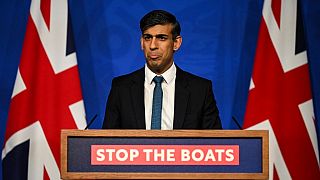Rwanda
On November 15, the United Kingdom's Supreme Court delivered a landmark ruling, declaring the UK government's migration strategy of sending asylum seekers to Rwanda as illegal. This decision, while reverberating through legal and political circles, drew a swift response from Rwanda, shaping a narrative of disagreement and potential diplomatic repercussions.
Alain Mukurariranda, Deputy Spokesperson for the Government of Rwanda, expressed Rwanda's commitment to respecting court rulings but asserted the possibility of disagreement. He challenged the UK judiciary's understanding of Rwanda's safety conditions, suggesting that a firsthand investigation in Rwanda would have been more appropriate before passing such a verdict. Mukurariranda underscored the absence of an invitation to Rwanda to participate in the court's hearing, raising questions about procedural fairness.
In response to the Supreme Court's ruling, Jean-Baptiste Gasominari, a lawyer and political analyst in Rwanda, offered insights into the potential impact on Rwanda's international image. Gasominari dismissed the notion that a ruling from one country could significantly tarnish the reputation of another. He emphasized that the UK courts might lack a nuanced understanding of Rwanda's situation, given their physical and cultural distance. Gasominari viewed the court ruling as a step in a more extended process, anticipating ongoing collaboration between the UK and Rwanda.
The UK's Prime Minister, Rishi Sunak, expressed dissatisfaction with the Supreme Court's decision, highlighting the importance of the "Rwanda policy" in addressing the issue of illegal migration to the UK. The disagreement between the two nations raises questions about the future of their partnership in managing migration and asylum.
Rwanda, in response, asserted its commitment to working with the UK on establishing a binding treaty. The aim is to reinforce existing guarantees necessary for the success of the partnership. This diplomatic approach suggests that Rwanda is keen on preserving its relationship with the UK while addressing concerns about the legality and safety of the migration strategy.












01:37
"Not good enough" - Rio Ferdinand slams UK government for lack of action on racism
Go to video
European leaders laud tougher migration policies but more people die on treacherous sea crossings
01:02
Pics of the day: April 24, 2024
Go to video
Botswana rejects controversial UK proposal on asylum-seekers
Go to video
Expulsions in Rwanda: genesis of a controversial bill
01:47
Britain's home secretary defends deal to deport asylum seekers to Rwanda